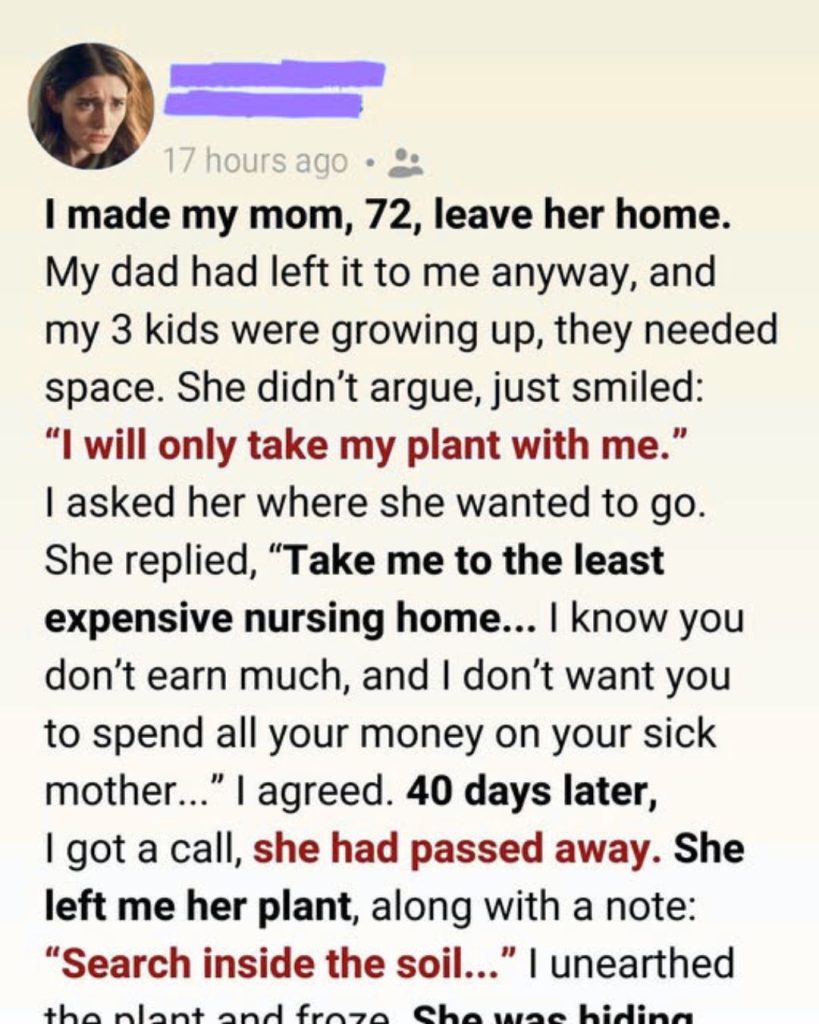
I made my mother leave her home when she was seventy-two years old.
It sounds cruel when I say it out loud. But at the time, I told myself I was being practical, not heartless.
The house had been left to me by my father. His will was clear. Legally, everything belonged to me. My three children were growing fast. Toys flooded the hallways. School bags piled into corners. Noise filled every room. My husband and I argued constantly—about space, about money, about exhaustion.
And I chose the easiest solution.
I chose to remove my mother.
That day, I stood in the doorway with my arms crossed, speaking like an adult handling a “necessary decision.”
“Mom… I think it’s better if you move to a nursing home. There will be people to care for you. We need the space.”
I braced myself for tears.
For anger.
For accusations.

But she didn’t fight me.
She looked at me for a long moment… then smiled. A small, tired smile. The kind that already knows the ending.
“I only want to take my plant with me,” she said.
That should have stopped me.
It didn’t.
I asked which nursing home she wanted, already uncomfortable, already eager to get through the conversation.
She answered gently, almost apologetically.
“Take me to the cheapest one. I know you don’t earn much. I don’t want you spending your money on your sick mother.”
The word sick made me shift in place. It forced me to face what I was trying not to feel.
I nodded. Too quickly. Relieved she wasn’t asking for more.
The day she left, she walked out slowly, carrying only a small worn bag and that green potted plant she watered every morning.
I didn’t help her down the steps.
I stood inside and watched through the glass, telling myself she was strong.
I told myself I’d visit.
I didn’t.
Life rushed in to fill the space she left behind. The kids claimed new rooms. The house grew louder, fuller—and somehow emptier. Sometimes I caught myself glancing at the corner where her chair used to be. Sometimes, late at night, I imagined the soft clink of her teacup in the kitchen.
I pushed those thoughts away.
Guilt was inconvenient.

Forty days later, my phone rang.
The nursing home.
Their voice was calm, practiced, careful.
“I’m sorry,” they said. “Your mother passed away this morning. She died in her sleep.”
I slid down to the floor because my legs stopped working.
Forty days.
That was all she had after leaving her home.
After leaving me.
They told me she had left something for me.
Her plant.
And a note.
I picked them up a few days later. The plant looked exactly the same—green, alive, stubborn. Like it was trying to keep living for her.
The note was folded neatly, her handwriting steady and familiar.
“Search inside the soil.”
“I’m sorry. I wish I could leave you more… but this is all I have.”
That night, after the kids fell asleep, I spread newspapers across the kitchen floor and placed the plant down carefully.
I told myself not to expect anything.
I dug slowly, afraid of damaging the roots. Afraid of breaking the last thing she had touched.
Then my fingers hit something hard.

I froze.
Buried at the very bottom were three small plastic bags.
Inside each one were gold coins—old, dulled with time, but unmistakably real.
Three bags.
Three children.
I collapsed on the floor with dirt on my hands and the plant tipped over beside me. My chest tightened until I couldn’t breathe.
She could have used that money.
She could have lived more comfortably.
Eaten better.
Stayed home longer.
Maybe lived longer.
But she didn’t.
She chose the cheapest nursing home.
She chose discomfort.
So she could leave something for my children—even after I had chosen convenience over compassion.
I held the plant against my chest like it was her body and cried apologies into the empty house.

I was sorry I didn’t visit.
Sorry I was cold.
Sorry I let her be alone when she needed me most.
I wish she were here so I could hold her now.
But all I have are three small bags of gold, a living plant, and a lesson I learned too late:
A mother’s love doesn’t stop—even when we fail her.